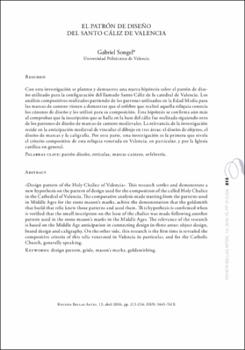El patrón de diseño del Santo Cáliz de Valencia
Author
Songel, GabrielDate
2016Abstract
Con esta investigación se plantea y demuestra una nueva hipótesis sobre el patrón de dise-
ño utilizado para la configuración del llamado Santo Cáliz de la catedral de Valencia. Los
análisis compositivos realizados partiendo de los patrones utilizados en la Edad Media para
las marcas de cantero vienen a demostrar que el orfebre que realizó aquella reliquia conocía
los cánones de diseño y los utilizó para su composición. Esta hipótesis se confirma aún más
al comprobar que la inscripción que se halla en la base del cáliz fue realizada siguiendo otro
de los patrones de diseño de marcas de cantero medievales. La relevancia de la investigación
reside en la anticipación medieval de vincular el dibujo en tres áreas: el diseño de objetos, el
diseño de marcas y la caligrafía. Por otra parte, esta investigación es la primera que revela
el criterio compositivo de esta reliquia venerada en Valencia, en particular, y por la Iglesia
católica en general. This research settles and demonstrate a
new hypothesis on the pattern of design used for the composition of the called Holy Chalice
in the Cathedral of Valencia. The comparative analysis made starting from the patterns used
in Middle Ages for the stone mason’s marks, achive the demonstration that the goldsmith
that build that relic knew those patterns and used them. This hypothesis is confirmed when
is verified that the small inscription on the base of the chalice was made following another
pattern used in the stone mason’s marks in the Middle Ages. The relevance of the research
is based on the Middle Age anticipation in connecting design in three areas: object design,
brand design and caligraphy. On the other side, this research is the first time is revealed the
compositive criteria of this relic venerated in Valencia in particular, and for the Catholic
Church, generally speaking.





